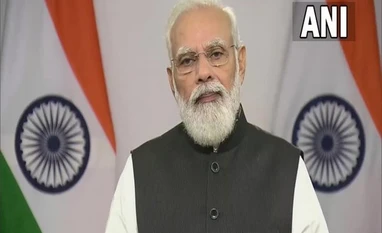PM bats for local languages in courts to boost confidence in judiciary
We need to encourage local languages in courts. This will not only increase the confidence of common citizens in the justice system but they will feel more connected to it: Modi
)
Narendra Modi
Prime Minister Narendra Modi on Saturday made a strong pitch for use of local languages in courts and explaining laws in simpler terms, saying that it will increase the confidence of common citizens in the justice system and they will feel more connected.
Addressing the inaugural session of the joint conference of chief ministers and chief justices of high courts, being held after a gap of six years, Modi said he had constituted a group to examine the possibility of whether laws can be drafted in legal language as well as in terms easily understood by the common man.
"I have set up a group that is examining whether both versions can be passed by the assembly or parliament, Modi said.
He said it is in practice in various countries and both the formats are considered legally acceptable.
"Even our scriptures state that justice is the basis of good governance. It is for this reason that justice should be linked to the people, it should be in the language. Unless the common man understands the basis of justice, for him there will be no difference between justice and executive order, the prime minister said.
Also Read
He also appealed to chief ministers and chief justices of high courts to give priority to cases related to undertrial prisoners languishing in jails and release them, as per law, based on human sensitivities and asserted that judicial reform is not merely a policy matter.
"Human sensitivities are involved and they should be kept in the centre of all deliberations, Modi said, noting that more than 3.5 lakh undertrials were languishing in jails.
In every district there is a committee headed by the district judge so that these cases can be reviewed and wherever possible, such prisoners may be released on bail, the prime minister said.
"I would appeal to all CMs and CJs of high courts to give priority to these matters on the basis of humanitarian sensibility and the law," he said.
On the issue of court proceedings, Modi said, "We need to encourage local languages in courts. This will not only increase the confidence of common citizens in the justice system but they will feel more connected to it."
In his opening remarks, Chief Justice of India (CJI) N V Ramana had stressed the need for the legal system to introduce local languages in courts.
The prime minister also appealed to chief ministers to repeal outdated laws to make the delivery of justice easier.
"In 2015, we identified about 1,800 laws that had become irrelevant. Out of these, 1,450 such laws of the Centre were abolished. But, only 75 such laws have been abolished by the states," he said.
Prime Minister Modi said as India celebrates the 75th anniversary of Independence, the focus should be on the creation of a judicial system where justice is easily available, is quick and for everyone.
"In our country, while the role of the judiciary is that of the guardian of the Constitution, the legislature represents the aspirations of citizens. I believe that the confluence of these two will prepare the roadmap for an effective and time-bound judicial system in the country," he said.
The prime minister emphasised that the government was working hard to reduce delays in justice delivery and efforts are on for increasing judicial strength and improving judicial infrastructure.
He said information technology has been deployed for case management and efforts to fill vacancies at various levels of the judiciary are underway.
He appealed to chief ministers and chief justices of high courts to take this forward. The e-courts project is being implemented in mission mode, Modi said.
The prime minister said subjects such as blockchain, electronic discovery, cybersecurity, robotics, artificial intelligence, and bioethics were being taught in law universities in many countries.
"It is our responsibility that in our country also legal education should be according to these international standards," he said.
Modi said mediation is also an important tool for the settlement of pending cases in courts, especially at the local level.
"With our rich legal expertise, we can become a global leader in the field of the solution by mediation. We can present a model to the whole world," Modi said.
(Only the headline and picture of this report may have been reworked by the Business Standard staff; the rest of the content is auto-generated from a syndicated feed.)
More From This Section
Topics : Justice N V Ramana Supreme Court Narendra Modi Indian Judiciary Local languages Indian languages
Don't miss the most important news and views of the day. Get them on our Telegram channel
First Published: Apr 30 2022 | 11:51 AM IST
